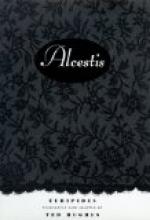HERACLES.
The two are different things in most men’s eyes.
ADMETUS.
Decide thy way, lord, and let me decide
The other way.
HERACLES.
Who
is it that has died?
Thou weepest.
ADMETUS.
’Tis
a woman. It doth take
My memory back to her of whom we spake.
HERACLES.
A stranger, or of kin to thee?
ADMETUS.
Not
kin,
But much beloved.
HERACLES.
How
came she to be in
Thy house to die?
ADMETUS.
Her
father died, and so
She came to us, an orphan, long ago.
HERACLES (as though about to depart).
’Tis sad.
I would I had found thee on a happier day.
ADMETUS.
Thy words have some intent: what wouldst thou
say?
HERACLES.
I must find harbour with some other friend.
ADMETUS.
My prince, it may not be! God never send
Such evil!
HERACLES.
’Tis
great turmoil, when a guest
Comes to a mourning house.
ADMETUS.
Come
in and rest.
Let the dead die!
HERACLES.
I
cannot, for mere shame,
Feast beside men whose eyes have tears in them.
ADMETUS.
The guest-rooms are apart where thou shalt be.
HERACLES.
Friend, let me go. I shall go gratefully.
ADMETUS.
Thou shalt not enter any door but mine.
(To an Attendant)
Lead in our guest. Unlock the furthest line
Of guest-chambers; and bid the stewards there
Make ready a full feast; then close with care
The midway doors. ’Tis unmeet, if he hears
Our turmoil or is burdened with our tears.
[The Attendant leads HERACLES into the house.]
LEADER.
How, master? When within a thing so sad
Lies, thou wilt house a stranger? Art thou mad?
ADMETUS.
And had I turned the stranger from my door,
Who sought my shelter, hadst thou praised me more?
I trow not, if my sorrow were thereby
No whit less, only the more friendless I.
And more, when bards tell tales, were it not worse
My house should lie beneath the stranger’s curse?
Now he is my sure friend, if e’er I stand
Lonely in Argos, in a thirsty land.
LEADER.
Thou callest him thy friend; how didst thou dare
Keep hid from him the burden of thy care?
ADMETUS.
He never would have entered, had he known
My grief.—Aye, men may mock what I have
done,
And call me fool. My house hath never learned
To fail its friend, nor seen the stranger spurned.
[ADMETUS goes into the house]
CHORUS.
Oh, a House that loves the stranger,
And a House for ever free!
And Apollo, the Song-changer,
Was a herdsman in thy fee;
Yea, a-piping he was found,
Where the upward valleys wound,
To the kine from out the manger
And the sheep from off the lea,
And love was upon Othrys at
the sound.




